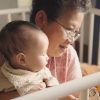
AsianScientist (Aug. 07, 2019) – With the rising life expectancy, smaller family sizes, maternal employment and single parenthood, grandparents and domestic helpers are stepping in to share childcare responsibilities. However, there is limited research on the impact of this shift on family well-being.
To address this, researchers at Nanyang Technological University (NTU), Singapore, conducted a study with hundreds of mother-child pairs and found that mothers who receive help with childcare from their own parents are more likely to show parental warmth to their children than mothers who do not receive support. The study’s findings were published in the Journal of Marriage and Family.
As more women join the workforce, childcare support has become essential for families with two working parents. In many cultures, such as China, involvement of grandparents in childcare is often expected. A 2008 survey in the country found that 58% of grandparents cared for their grandchildren. The demand for domestic helpers for childcare support has also increased in societies with growing work-family conflict among dual-career couples.
In this study, the researchers defined a caregiver as someone who spends at least two hours with the child each week and is responsible for certain aspects of the child’s daily routine, such as school drop-offs and pick-ups, bedtime routines, bathing, helping with schoolwork and going on outings.
The international research team comprised entities such as Vrije Universiteit in the Netherlands and the Harvard T. H. Chan School of Public Health in the US, as well as researchers from A*STAR’s Singapore Institute for Clinical Sciences, KK Women’s and Children’s Hospital, Yong Loo Lin School of Medicine, National University of Singapore, and National Institute of Education.
The team analyzed caregiving arrangement data from 615 mother-child pairs enrolled in the Growing Up in Singapore Towards healthy Outcomes (GUSTO) cohort study. The children involved in the study were between 4½ years old and six years old.
The research focused on mothers, as previous studies have suggested that childcare support may have a more significant effect on mothers than fathers, although it can alleviate practical and emotional childcare burdens for both parents.
The mother-child pairs were sorted into five groups based on the type of caregivers: no support, domestic helpers, maternal grandparents, paternal grandparents, and maternal and paternal grandparents.
Out of the 615 mother-child pairs in the study, 446 pairs had information on caregiving arrangements when the children were 4½ years old. In comparison, 514 pairs had information on caregiving arrangements when the children were six years old.
Mothers were requested to document family well-being outcomes, such as their parenting and well-being when their child was 4½ and six years old and family functioning when children reached six years old. The researchers then examined the connection between each type of caregiving arrangement and family well-being outcomes.
At the age of 10, kids were asked to identify any signs of depression, such as feeling very self-critical or experiencing disturbances in their sleep and eating habits, using a validated questionnaire.
The researchers then looked at this information and how the children were cared for to see if there were any connections. They found that when their child was six, mothers who had received support from their own parents reported engaging in more positive parenting, characterized by warmth, responsiveness and a stimulating home environment.
According to lead researcher and associate professor at NTU’s Early Cognition Lab, Setoh Peipei, there is a growing trend of grandparents and domestic helpers becoming involved in childcare due to the prevalence of dual-income households. Peipei emphasized the need to understand the long-term effects of maternal grandparental, paternal grandparental, and non-kin help on grandchildren’s outcomes and family well-being.
“While maternal grandparents, paternal grandparents, and domestic helpers all have the potential to provide instrumental assistance and emotional encouragement when it comes to childcare duties, our study found that childcare support from maternal grandparents was the most beneficial. This finding supports the idea introduced in earlier research that maternal grandparents are uniquely positioned to provide support in a manner most aligned with the needs of mothers, possibly due to shared values and ease of communication,” said Peipei, who is also associated with the Psychology division at NTU’s School of Social Sciences.
Though the research was conducted in Singapore, the researchers noted that the distinction between support from maternal and paternal grandparents could be applicable in other Asian countries, where the involvement of grandparents in caregiving is culturally expected.
The research team is also interested in examining whether the benefits of maternal grandparenting last into a grandchild’s teenage and young adult years and if it affects the family’s path in life.
—
Source: Nanyang Technological University; Image: Shutterstock
The article can be found at Grandparents’ and domestic helpers’ childcaresupport: Implications for well-being in Asian families
Disclaimer: This article does not necessarily reflect the views of AsianScientist or its staff.

